By de-certifying Iran’s compliance with the Joint Comprehensive Plan of Action (JCPOA), President Trump has effectively abdicated his responsibility on an extremely delicate—and consequential—foreign policy decision and subjected it to political considerations. This, in spite of the fact that many cabinet members and top Republicans have recommended a different course of action.
Playing politics with core strategic foreign policy interests will only erode the president’s credibility, his relationship with allies, and U.S. leadership on the global stage.
A risky game for the president’s street cred
In the 60-day period that Trump’s de-certification has opened, Congress can now decide whether it wants to re-impose sanctions on Iran, broaden the scope or nature of sanctions, or do nothing at all. President Trump might actually find any of these outcomes satisfactory: De-certifying the Iran deal is enough to fulfill a long-standing campaign promise, extending a gesture towards his electoral base, regardless of the actual fate of the deal.
However, the message behind each option is fairly distinct. If Congress does nothing, it would effectively declare the president’s opinion unimportant or erroneous. If Congress imposes new sanctions addressing some of Tehran’s regional security challenges rather than nuclear-related sanctions, it would send a paradoxical message: Iran violates the “spirit of the deal,” but the nuclear deal is not “bad,” contrary to what Trump says. Congress could also remove the necessity for Trump to periodically certify the deal, effectively unplugging the president. The response of a Republican-dominated Congress to Trump, with which he has had deteriorating relations, will be a test of his leadership within his own camp.
Politics, not policy
President Trump has hardly ever argued publicly about the substance of the Iran deal, except on Friday, but calls it “one of the worst and most one-sided transactions the United States has ever entered into.” If it looks like he doesn’t really care about details of the policy, it’s because it’s true. What President Trump really wants is nothing less than a complete clean slate from his predecessor, almost regardless of substance. Since taking office, he has tried to systematically obliterate all of Obama’s signature advancements, be it on healthcare, financial regulations, climate and energy regulations, trade, Cuba, or anything else. This time, too, his announcement on de-certification appears to be about scoring political points, not about advancing policy.
A pendulum swing on foreign policy between administrations is not unprecedented. Backed by Congress’s refusal to ratify it, President Bush rejected the Kyoto Protocol and its obligations a few months only after President Clinton signed it. President Obama’s campaign promise to pull out of Iraq translated into a stubborn refusal to maintain a U.S. security force presence or get further involved in Iraq’s democratization process.
But this time the frustrations are running even higher, given that the Trump administration seems to have engaged in a complete U-turn on all of Obama-era legislation. Years of difficult negotiations on the Trans-Pacific Partnership were declared useless when U.S. participation vanished overnight. On some issues, the pendulum even swung several times in a row. Keeping the Kyoto Protocol precedent in mind, Team Obama insisted that the 2015 Paris Agreement on climate should be non-binding, in order to bypass the congressional political hurdle. But efforts to accommodate U.S. domestic constraints proved useless, as the new president has given it the final blow. The Iran nuclear deal could be the latest example of excessive variations in U.S. foreign policy commitments.
Although changes are to be expected every time the opposition wins the next round, this time the about-face has been excessive and counter-productive. Instead of symbolic gestures that come with a high risk attached, President Trump could have chosen to shift course more subtly. On climate, the administration could have simply revised the U.S. contribution to carbon-emission reduction (nationally determined contribution, or NDC) instead of pulling out of the Paris Agreement. Similarly, on the Iran deal, Trump could have focused on renegotiating the sunset clause by striking a deal with the Europeans, rather than going for inefficient foreign policy grandstanding.
Damaging U.S. leadership
The American presidential system gives the false impression that every incumbent can reset the clock. But when deals have been made, the international community has some expectations, and U.S. credibility is on the line. That is why repudiation of a predecessor’s legacy comes at a cost. Over the next few weeks, many countries will weigh in on the sanctions debate taking place in Congress. Several of them, including close European allies, will lobby members of Congress not to follow their president’s leadership. It is never a sign of presidential strength when foreign leaders contradict the president by going directly to Congress, as Netanyahu famously did on the Iran deal. Europeans will protest against Congress passing legislation to create automatic snap-back based on specific “triggers,” and might consider it a violation of the JCPOA. And it could also go further: In an effort to show the ineffectiveness of Trump’s decision, European diplomats have threatened to use mechanisms to block secondary sanctions, effectively nullifying the U.S. president’s will. These measures reveal a sorry state of affairs for the trans-Atlantic camp, highlighting deep divisions between allies and an unwillingness on the part of Europeans to follow the mood of the moment.
U.S. credibility is on the line.
By positioning himself as the anti-Obama, Trump is taking decisions that he has not fully thought through. His relentless drive to dismantle Obama’s legacy has weakened the word of the world’s most powerful head of state and is slowly but surely nibbling away at U.S. credibility on the global stage. Congress is given the opportunity to show that the voice of America still matters, that the United States is committed to some policy consistency, so that negotiating with the United States does not become an increasingly pointless exercise. If Congress chooses to unilaterally re-impose nuclear-related sanctions, it might strengthen President Trump’s leadership domestically, but it will abdicate U.S. global leadership. In these conditions, Russia, China, or European allies might decide they don’t need to follow America’s lead.
The Brookings Institution is committed to quality, independence, and impact.
We are supported by a diverse array of funders. In line with our values and policies, each Brookings publication represents the sole views of its author(s).

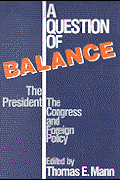

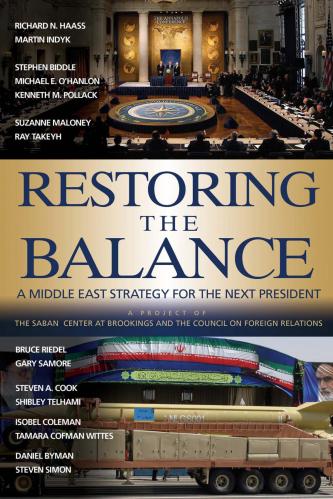
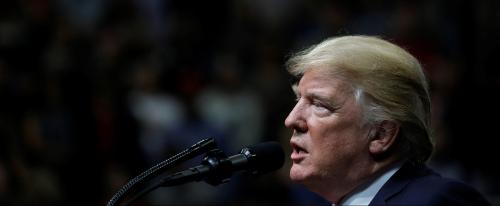
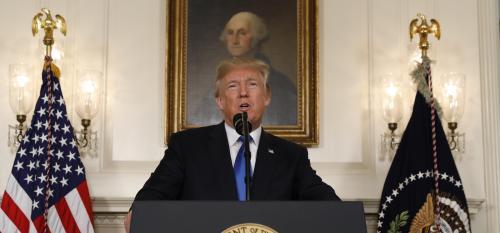
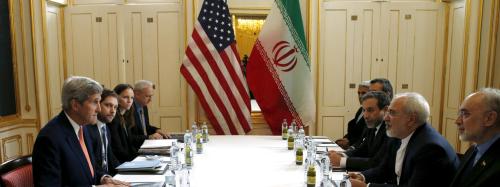




Commentary
When American politics jeopardize American global leadership
October 16, 2017